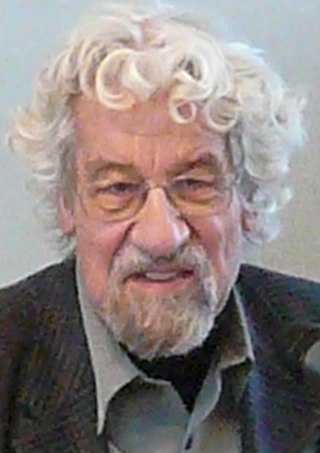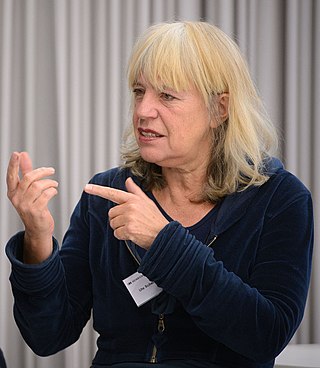Related Research Articles
Friedrich Hartjenstein was a German SS functionary during the Nazi era. A member of the SS-Totenkopfverbände, he served at various Nazi concentration camps such as Auschwitz and Sachsenhausen. After the Second World War, Hartjenstein was tried and found guilty for murder and crimes against humanity.

Hans-Peter Dürr was a German physicist. He worked on nuclear and quantum physics, elementary particles and gravitation, epistemology, and philosophy, and he advocated responsible scientific and energy policies. In 1987, he was awarded the Right Livelihood Award for "his profound critique of the Strategic Defense Initiative (SDI) and his work to convert high technology to peaceful uses."

Johannes Daniel Dahm is a German geographer, ecologist, activist, consultant and entrepreneur.

Werner Sobek is a German architect and structural engineer.
Imanuel Geiss was a German historian.

Neue Marx-Lektüre or NML is a revival and interpretation of Karl Marx's critique of political economy, which originated during the mid-1960s in both Western and Eastern Europe and opposed both Marxist–Leninist and social democratic interpretations of Marx. Neue Marx-Lektüre covers a loose group of authors mainly from the German-speaking countries who reject certain historizing and empiricist interpretations of Marx's analysis of economic forms, many of which are argued to spring from Friedrich Engels and his role in the early Marxist workers' movement.
Gerhard Stapelfeldt is a German sociologist. He was a university teacher at University of Hamburg until December 2010.

Niko Paech is a German economist. Since 2018, he has been Assistant Professor at the University of Siegen. From 2010 to 2018, he was substitute professor at the chair of production and environment (PUM) at the University of Oldenburg. His research is in the fields of environmental economics, ecological economics and sustainability science.

Friedhelm Gehrmann is a German scientist in the field of economics and social sciences. Since 1981, he has been teaching and consulting in the fields of “International Knowledge and Technology Transfer.” At present, he is the director of the institutes “Global Consulting and Government” and “Renewable Energy, Technology and Management” at Steinbeis-Hochschule Berlin.

Volker Hauff is a German politician of the Social Democratic Party (SPD).
Eva Lang is a German economist. Before her retirement, she was full professor at Bundeswehr University Munich for economic policy in special consideration of political economy.
Vereinigung für Ökologische Ökonomie (VÖÖ) is a German scientific society promoting ecological principles in the global economy.

Gerhard Zwerenz was a German writer and politician. From 1994 until 1998 he was a member of the Bundestag for the Party of Democratic Socialism (PDS).

Eveline Lemke is former German politician and member of the Alliance 90/The Greens. From 18 May 2011 until 18 May 2016, she was vice minister president of Rhineland-Palatinate and Minister for Economics, Climate Protection, Energy and Regional Planning. On 27 March 2011, she was elected into the Landtag of Rhineland-Palatinate. She was the leading candidate for her party in the 2016 Rhineland-Palatinate state elections along with The Greens faction leader in the Landtag, Daniel Köbler, after having been leader of the party since 2006. As vice minister Lemke represented the state of Rhineland-Palatinate in the German Bundesrat. As author and speaker in green technological issues and Circular Economy, she founded Thinking Circular in 2017. This thinktank is listed in the Sustainable Development Goals Help Desk, a platform by the United Nations since July 2018. She is also working as consultant together with Prof. Michael Braungart, chemist and inventor of the design philosophy Cradle-to-Cradle, Martin Lees and David Wortmann (DWR-Eco-Innovation-Alliance).

Growth imperative is a term in economic theory regarding a possible necessity of economic growth. On the micro level, it describes mechanisms that force firms or consumers (households) to increase revenues or consumption to not endanger their income. On the macro level, a political growth imperative exists if economic growth is necessary to avoid economic and social instability or to retain democratic legitimacy, so that other political goals such as climate change mitigation or a reduction of inequality are subordinated to growth policies.
Professor Hans-Erich Volkmann is a German historian, whose works primarily deal with the history of Germany from the 19th–20th century, and particularly how it relates to the East European states. He is most notable for being one of the authors of the first volume of Germany and the Second World War. He has also been one of the editors of Militärgeschichtliche Zeitschrift.

Ulrich Menzel is a German political scientist.
Willi Alfred Boelcke was a German Economic and Social Historian, journalist, prolific author, essayist and retired university professor. The focus of his research and output has been on Germany during the nineteenth and twentieth centuries.

Ute Scheub is a German journalist-commentator, political analyst and author. A woman of robust intellect and powerful convictions, she is also sometimes identified as a campaigner.
The Frankfurt-Hohenheim Leitfaden is the first criteriology for ethical-ecological evaluation methods for monetary and capital investments. The guide screens public companies for cultural, social, and natural compatibility and is the most comprehensive criteriology for ethical investments. It was developed in 1997 by the research group "Ethical-Ecological Rating", which Johannes Hoffmann and Gerhard Scherhorn founded in 1992.
References
- ↑ Project Group Ethical-Ecological Rating, Oekom Research AG (ed.), seen July 24, 2022 (German)
- ↑ Moralischer Mehrwert, Brand eins, 2002, retrieved September 14, 2022 (German)
- ↑ Nachruf auf Gerhard Scherhorn 21.2.1930 – 28.2.2018, Vereinigung für Ökologische Ökonomie, accessed October 25, 2019.